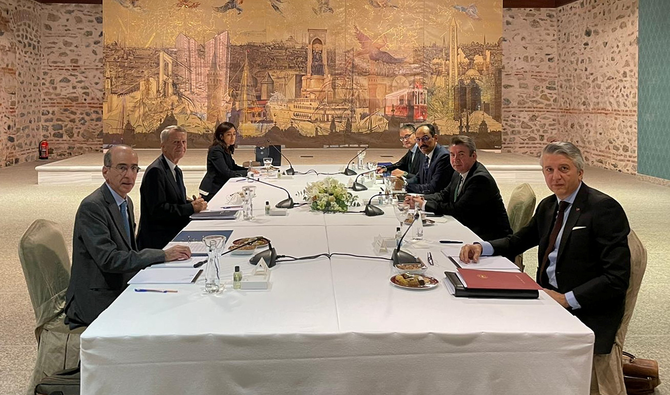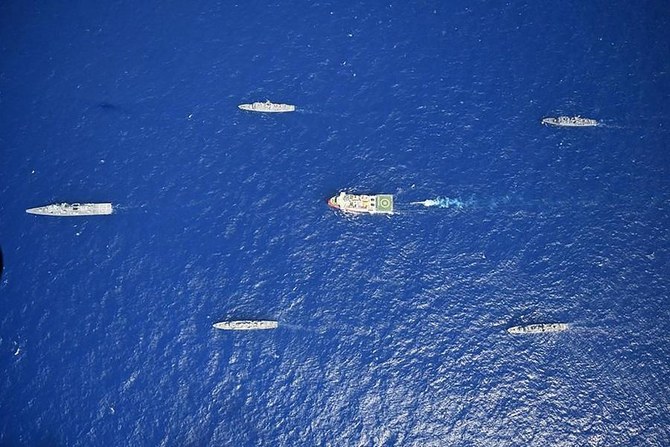ANKARA: Turkey and Greece on Monday held talks aimed at resolving maritime disputes, the first exploratory talks held since 2016.
Bilateral relations have been under particular strain since last year, when Turkey sent an energy exploration vessel to disputed waters near Greek islands. The move led to a crisis, with EU leaders threatening sanctions.
The two NATO members held 60 rounds of talks, described as exploratory rather than official, between 2002 and 2016.
Experts cautioned against having high expectations about any immediate success from the talks, which resumed after a years-long hiatus.
Dr. Zenonas Tziarras, researcher at PRIO Cyprus Centre, said the exploratory talks were not negotiations as such and, therefore, no agreement was expected.
“They aim to explore the intentions and positions of the two parties as well as set the agenda of the actual negotiations,” he told Arab News. “Much will depend on whether they can agree to limit the agenda to the issue of maritime zones, such as continental shelf, exclusive economic zone and perhaps territorial waters, leaving items that Turkey wants to add - like demilitarization of the islands - out.”
He said that although Turkey initiated the talks, they had been scheduled for last summer and got sidetracked by the Greek-Turkish crisis. “Turkey has made this move because, just like Greece, it sees the talks as a mechanism for de-escalation that allows it to focus on other problems and a projection of ‘good behavior’ in light of the new presidency in the US.”
He added that Turkey was trying to convince the West, including the US and the EU, that it remained a committed Western partner.
“However, these are tactical moves that aim to appease harsh reactions to Turkish foreign policy from the EU and the US, such as more sanctions, and allow Ankara to reap more benefits from these relations.”
Greece wants to limit the talks to rival interpretations about the delimitation of maritime boundaries under the principles of the UN Convention on the Law of the Sea, which Turkey is not a party to.
But maritime delimitation talks could take a long time as neither side appears ready for compromises that could cost them popular support at home.
“We will attend with optimism but zero naivety,” Greek Prime Minister Kyriakos Mitsotakis told a parliamentary session, referring to the disagreements with Turkey over maritime borders.
Turkey also intends to discuss a range of other long-running and thorny issues, such as the demilitarization of Greek islands or sovereignty of certain rocks. It accuses Greece of illegally deploying troops on some islands.
The two countries almost came to blows in 1996 over the sovereignty of an uninhabited Aegean islet.
“If there is a convergence of interests and an agreement on the agenda, the two sides can either solve the issue politically or refer their dispute to the International Court of Justice,” George Tzogopoulos, a senior fellow at the International Center of European Formation, told Arab News. “The process will be a long and time-consuming one.”
The talks follow Turkish President Recep Tayyip Erdogan dialling down his confrontational rhetoric toward the EU, emphasizing his willingness to open a new chapter in relations with the bloc.
“I would judge the success of these talks if both parties decide on the continuation of talks,” Sinan Ulgen, a former Turkish diplomat and chairman of the Istanbul think-tank Edam, told Arab News. “But it is important that these talks serve as an insurance policy against any potential escalation in the East Med.”
A NATO defense ministers meeting in February and an EU summit in March also serve as an additional source of leverage over the talks between the two neighbors.
Tzogopoulos was pessimistic about a breakthrough but optimistic about a joint understanding of the need for some bilateral and multilateral cooperation.
“For now, Greece counts on calmness in the Eastern Mediterranean in order to concentrate on its post-COVID-19 economic recovery and the absorption of EU funds. Turkey, for its part, is also looking for calmness in its interest in recalibrating its relations with the EU as well as with the new American administration.”
The exploratory talks in Istanbul coincide with intense discussions about potential EU sanctions against Turkey over its energy exploration in the disputed waters of the eastern Mediterranean. Brussels pledged to enlarge a sanctions blacklist with more names.
A controversial agreement from 2019 between Turkey and Libya over the maritime borders in the Mediterranean could also be jeopardized by the exploratory talks.
The agreement delineated the maritime borders between the Greek island of Crete and Cyprus.
It was criticized by the EU, which described it as a serious breach of international law, but is likely to be used as a bargaining chip against another deal that was signed last August for the partial demarcation of maritime boundaries between Greece and Egypt.
Tzogopoulos said that Greece would rely on its agreement with Egypt and that Turkey would turn to its agreement with Libya if a formal dialogue on maritime zones started.
“Some zones covered in the two agreements do overlap, whereas other zones remain undelimited. So, a potential settlement requires compromises by the two countries as well as the participation of other countries of the Mediterranean in talks.”





























